Yemen doesn’t top desired destination lists for most casual trekkers. However, guided treks in the Arabian Peninsula and eastern Mediterranean countries have become more established in recent years, according to James Willcox of tour operator Untamed Borders. The global travel operator will offer its first-ever guided trek in mainland Yemen for nine days in early 2025, giving 10 trekkers the chance to explore the country’s Hadramout region along with an Untamed Borders guide and local Bedouin villagers assisting en route.
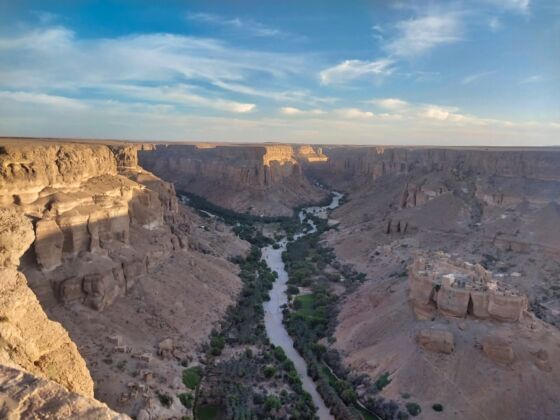

Take Part in Pioneering A New Yemen Trekking Route In 2025
Logistics for embarking on Untamed Borders Yemen trek in 2025
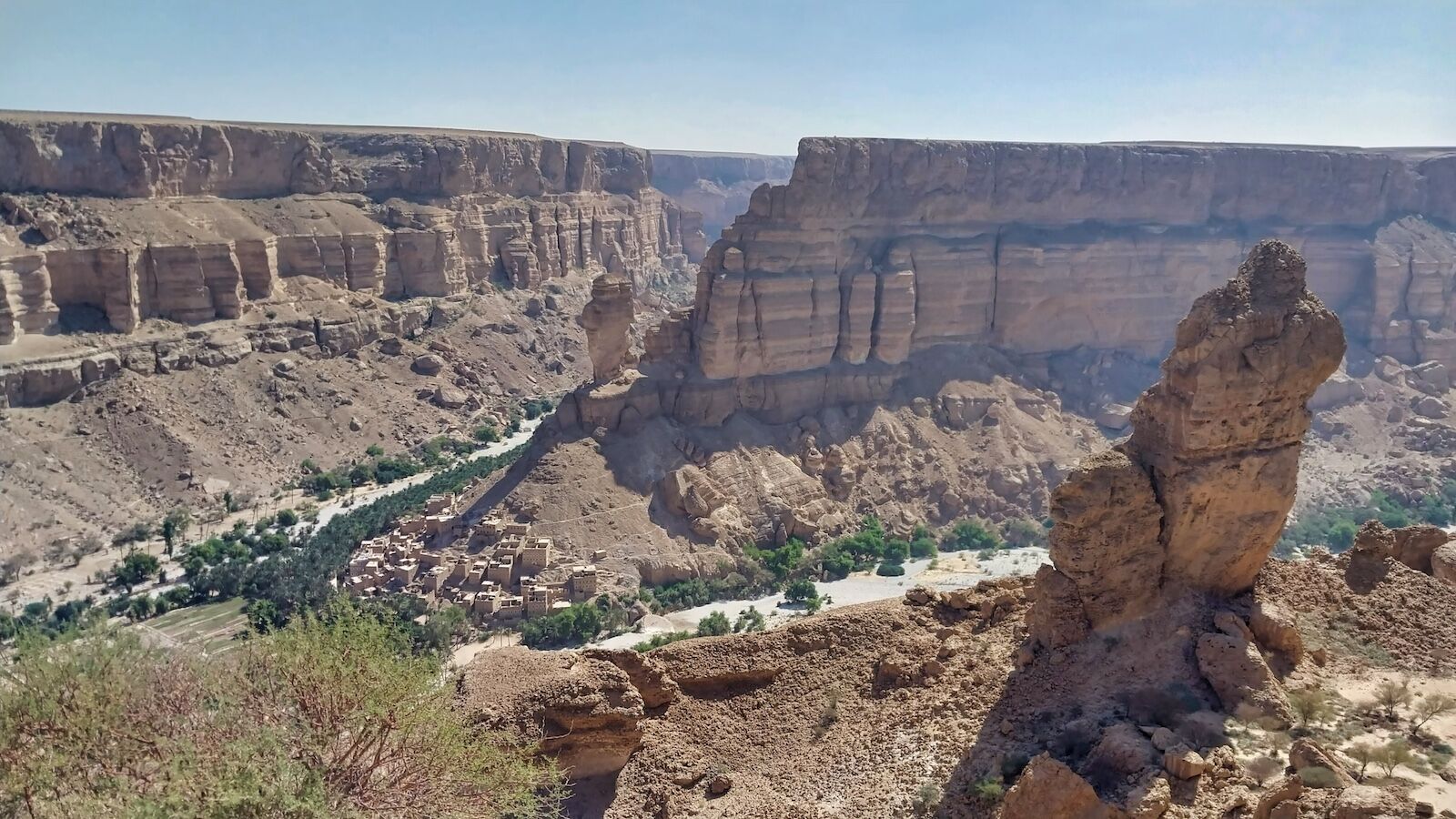
Trekkers will pass this canyon in Wadi Dawan. Photo courtesy Untamed Borders
The trek will cover the wadis, or dry valleys between desert mountains, and desert-scapes of eastern Yemen’s Hadramout region, beginning January 28 and reaching the end of the trail on February 6. Travelers must arrive in Cairo prior to the departure date and will fly together to Seiyun, Yemen, from there. Following the trek, the group will return to Seiyun to fly back to Cairo.
“There’s an area called Wadi Dawan, and others wadis in the region, and inside these wadis (are) villages,” Untamed Borders founder James Willcox told Matador. “They’re all mud-built, not really towns but more like oases. We’ve set up a route to visit them and experience what their life is like.”
These areas house the route Untamed Borders has established for this trek. The only flights into the mainland of Yemen are with Yemenia Airways, a Yemeni airline that flies in from Cairo. The airline’s flights aren’t generally listed on flight comparison sights, and as such, Untamed Borders handles the booking of its guests’ flights into and out of the country. Travelers are responsible for getting to Cairo, and everyone on the trek will fly into Yemen together. Other logistics, including visas and additional paperwork, will be handled in advance by Untamed Borders.
“We need a whole bunch of documentation from the Yemeni government,” Willcox says. That’s because guests need a visa, a security document, and other permissions. There are effectively three governments that must provide permissions – the Houthis, as well as two anti-Houthi groups, including the Southern Transition Council (STC) and the old Yemeni government.
Travelers will receive confirmation of their visa status and permissions prior to flying into Yemen. Once in-country, the group will head to Shibam, a UNESCO World Heritage Site known as the Manhattan of the Middle East for its mid-rise mud buildings. Here, the group will experience one of the country’s poshest hotels overlooking Wadi Dawan and take in the sunset over the UNESCO site. The 8-day trek begins at Wadi Darwan. The operator provides all food and camping equipment and hopes to include a toilet and shower tent — quite a luxury in this wild landscape. Trekkers will carry daypacks with minimal supplies, the rest being carried by the camels. Throughout, guests will interact with local Bedouin villagers and experience Yemeni cuisine and culture.
Check out Matador’s podcast interview with Untamed Borders founder James Wilcox
What is the trail like, and how did this trek come to be?
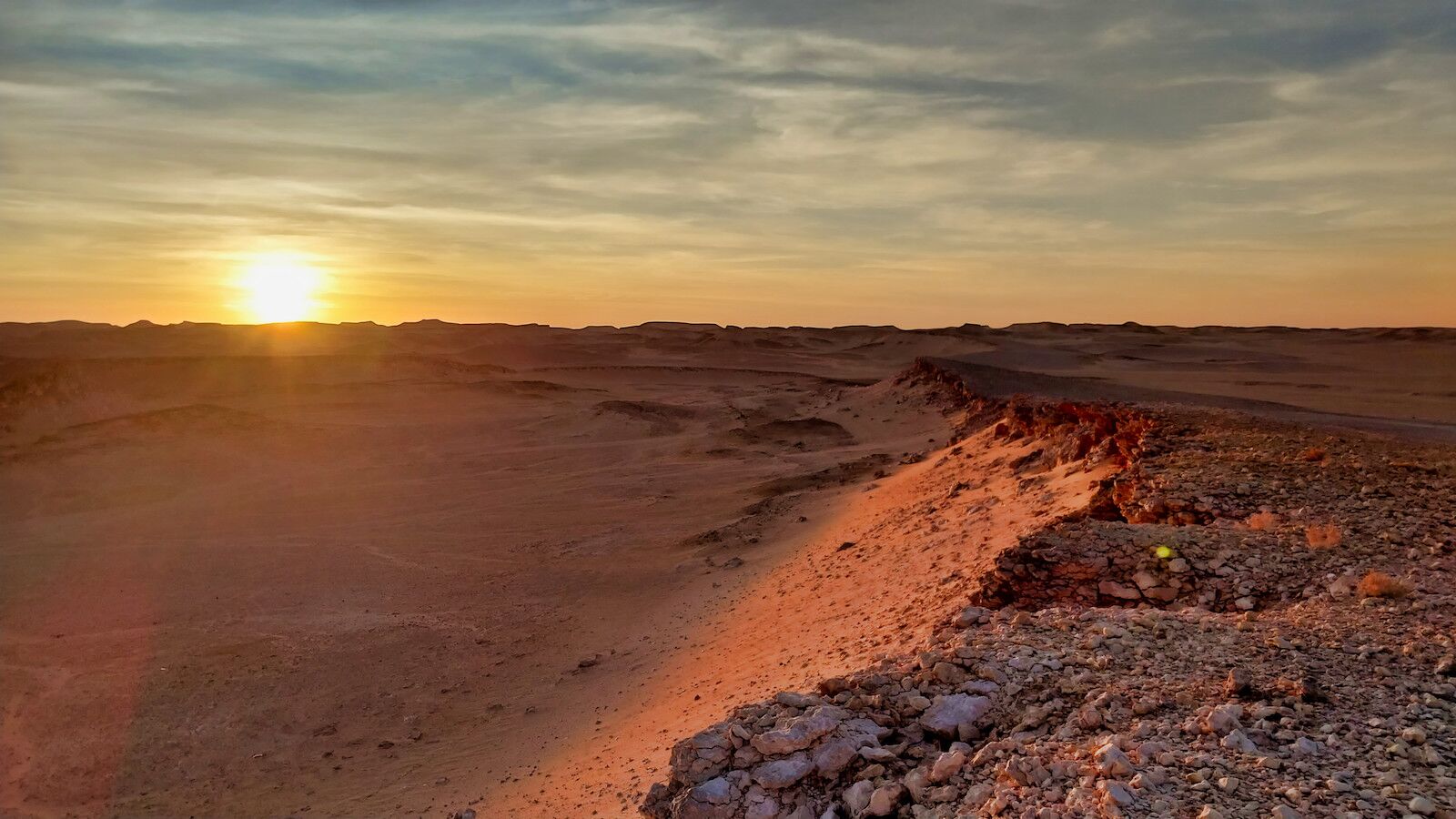
Photo courtesy Untamed Borders
The idea was born between Wilcox and two of his guides, including Ade Summers, who will lead the 2025 expedition. The group planned to develop a trekking route through multiple wadis and villages, partnering with local residents to provide an economic boost to their villages and a more thorough experience for the trekkers. Over the winter of 2024, the team visited the region to develop the route and work through the logistics with locals on the ground.
“There was some tourism there before the current conflict, but no one had really done trekking trips to those areas,” Willcox, the tour guide, says. “The route that we’ve done is a new route. We’ve come up with it ourselves in collaboration with the local team. As well as it being something fun for our clients, we think it’s really good that we get to work with the local guys there and train them up to be competent enough to be able to do this for future tourists, and future income for the area. It’s not just cultural tourism, they’ll have other types of tourism as well.”
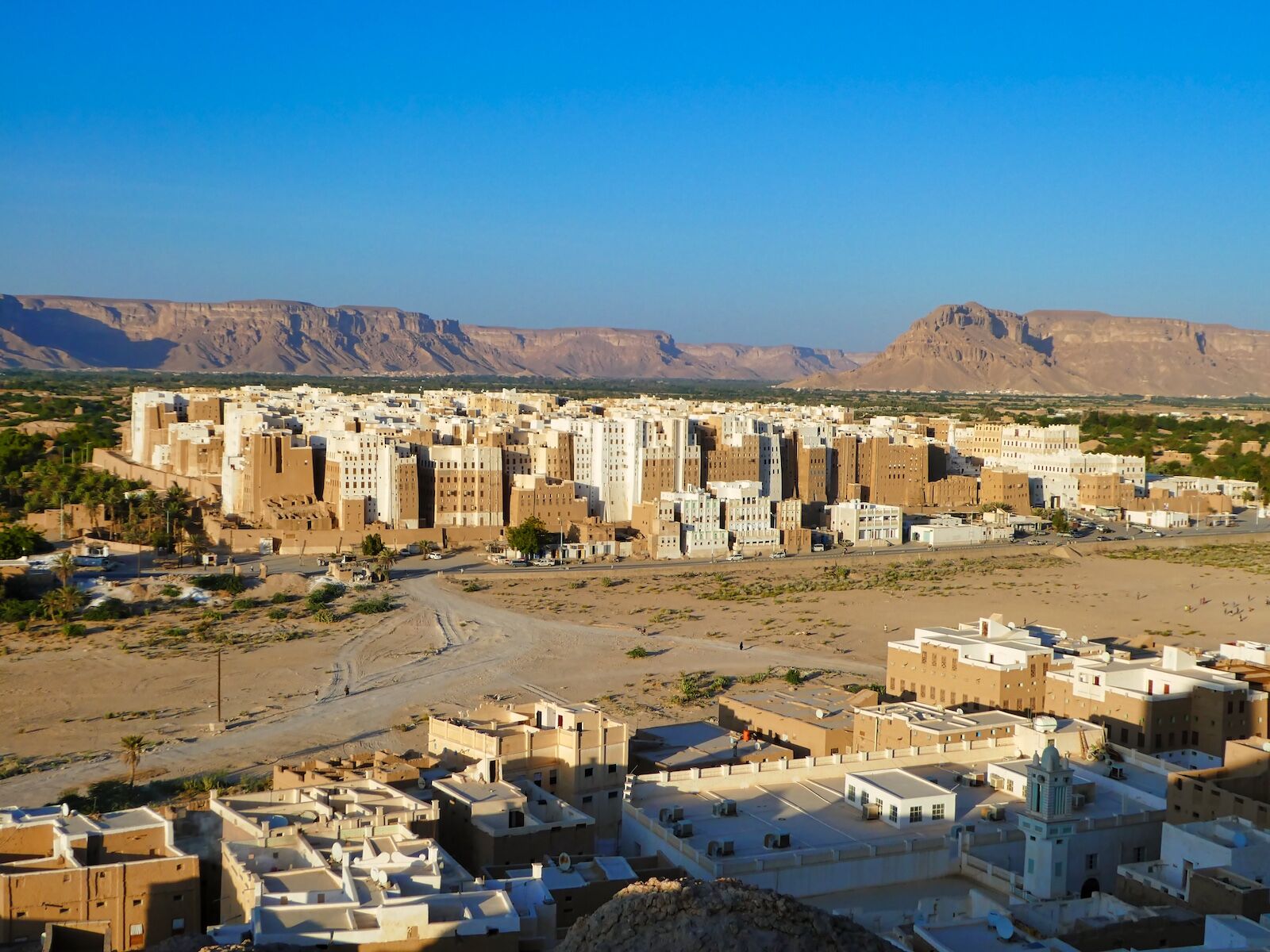
Trekkers will visit the UNESCO World Heritage Site of Shibam, known as the Manhattan of the Middle East. Photo courtesy Untamed Borders
Lest you think you’re tossing yourself into the abyss with an overly ambitious crew, Untamed Borders began organizing tours and private trips for journalists and other professionals in Pakistan and Afghanistan in 2008. It has since expanded across the region to include other parts of the Middle East, northern Africa, and elsewhere. The company has employed the first female tour guide in Afghanistan and Tajikistan. In 2019, the company piloted its first traveler-oriented trips in Yemen with Summers at the helm.
“Most of the trails on this trek are goat tracks,” Summers says. “We’re using camels as our logistics, which is quite cool. They’ll be carrying the tents and the food.”
In the case of an emergency, the trail will not be more than about 13 miles from a Jeep road, and Jeeps will be used as emergency response vehicles if necessary.
Summers is a former engineer who became bored with office life. After overlanding across Australia, he moved to Mongolia, and eventually made his way to Pakistan and elsewhere in the region. He developed a desire to help shatter preconceptions about this part of the world and show those interested the nuanced splendor of traveling beyond the usual tourist and backpacker circuits.
“Because people perceive this to be such an extreme place, and the history and culture of the place,
the experience of traveling (in Yemen) is so much richer,” Summers says.
How current events play into the trip-planning process
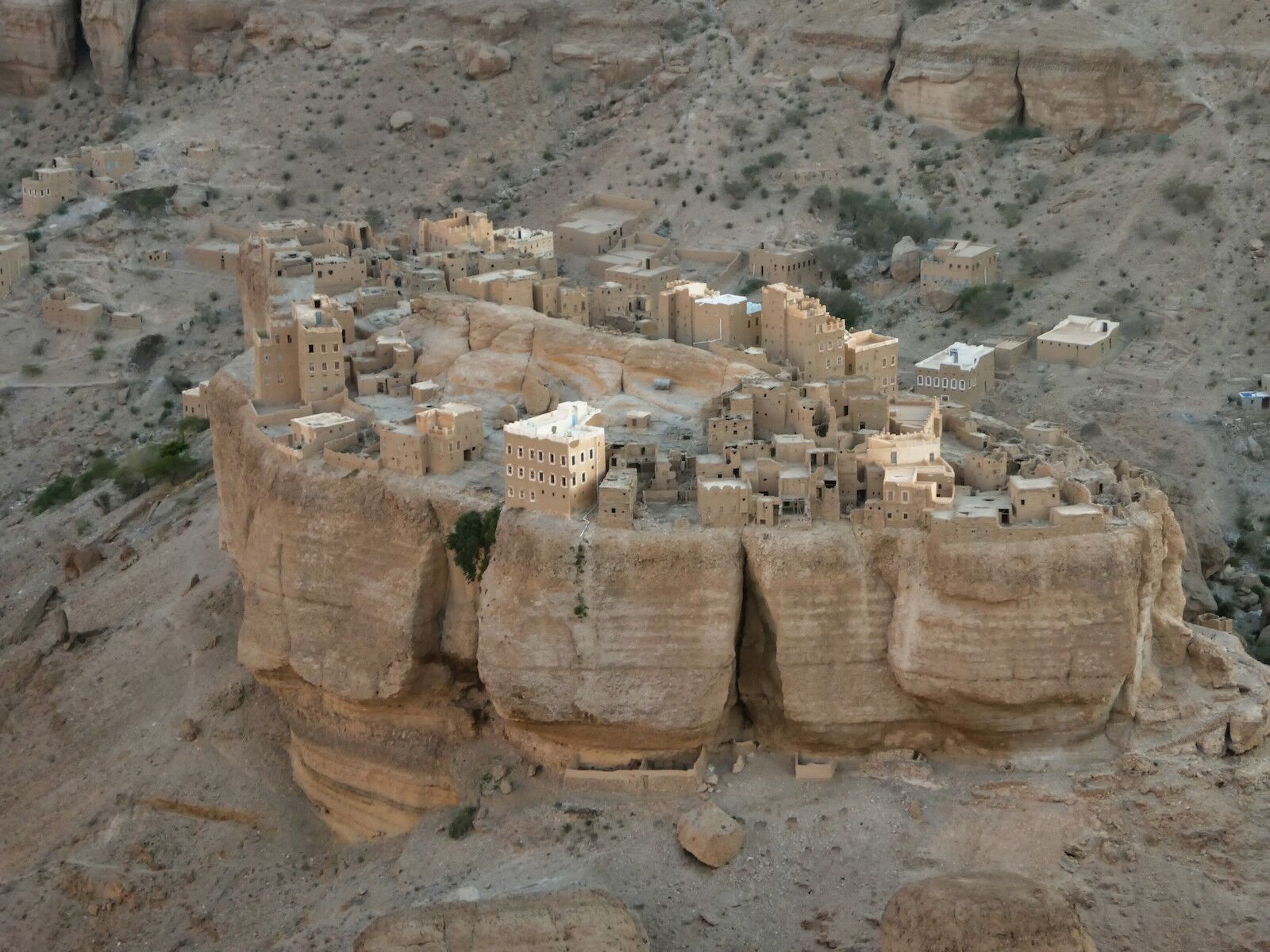
A Bedouin village along the route. Photo courtesy Untamed Borders
During the ongoing conflict between Israel and Hamas, the organized Hothi group of Yemen has launched assaults on maritime vessels passing through the Red Sea. The Untamed Borders team team saw no problems with the current conflict during its route-planning expedition in January. The trek is not in an area of the country experiencing Houthi-driven conflict, passing instead through remote and largely self-sufficient villages and areas. Part of the trip’s goal, Wilcox emphasizes, is to showcase to travelers that there’s more to Yemen that what is portrayed in the mainstream media.
“As soon as you start doing a bit of research and asking the right questions, you’ll soon realize there’s no conflict in that area,” says Summers. “It’s all on the coast and in what we’re calling the west of the country. It’s not like the whole country’s in conflict.”
The precautions taken by Untamed Borders and its local partners mean it can offer a safe route for guests, in which they can interact with locals in the desert villages along the way. The experience in Yemen speaks to Untamed Borders larger goal of helping the public see through widely-held misconceptions about this part of the world.
“At a cursory glance, this may not seem like a good place to go,” Willcox says. “But when they actually go they realize that it’s a lot more nuanced.”
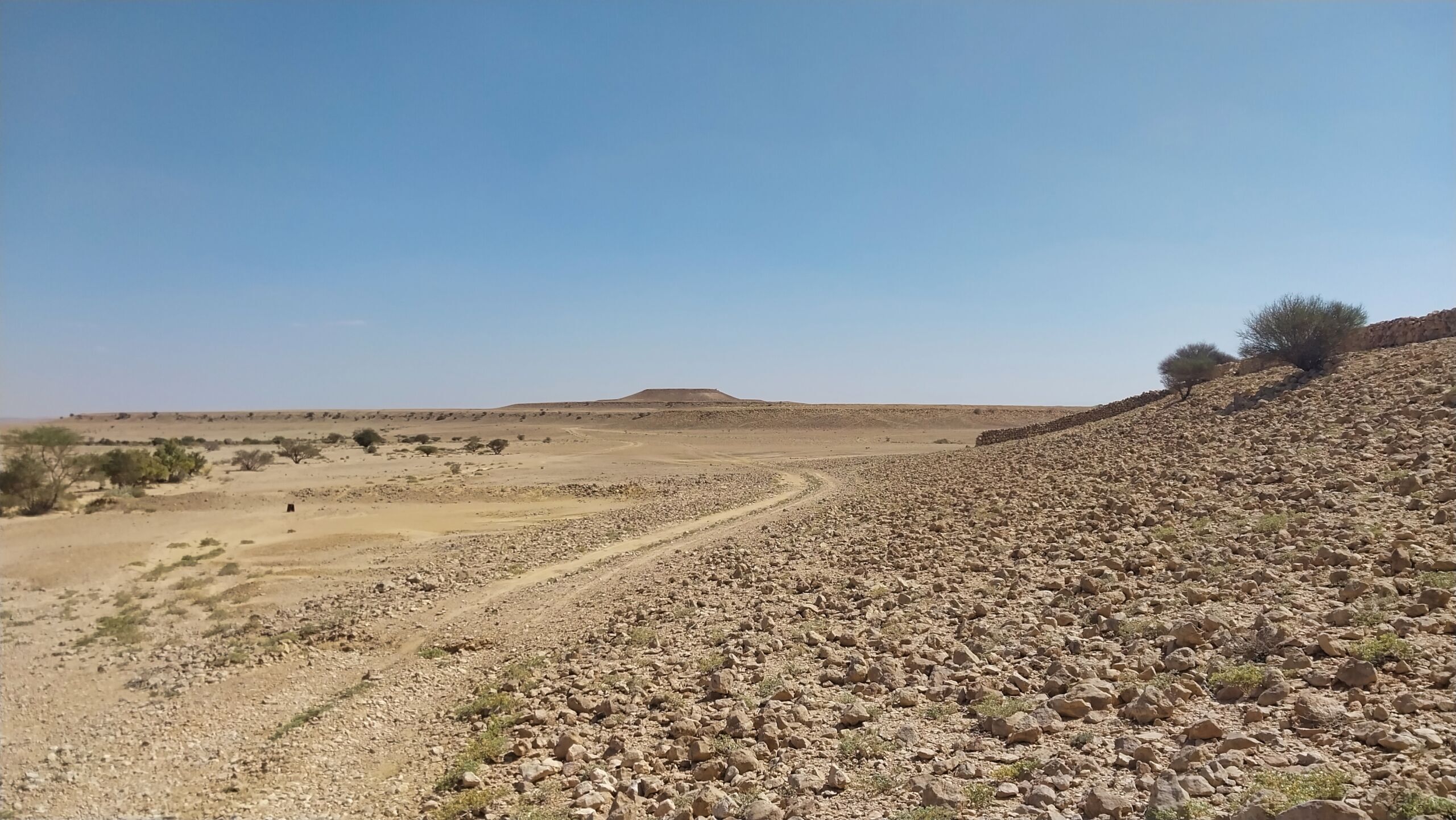
Photo courtesy Untamed Borders
The company was formed as a collective initiative between Willcox, a Pakistani contact, and an Afghan contact, the former of whom is still involved in the company. It’s earliest work was organizing trips for war journalists and other professionals assigned to cover difficult-to-access regions. Wilcox saw the value of helping them provide a better understanding of these places, and felt that providing the same service to the general public could be quite an opportunity.
“For me, it doesn’t make any sense to promote the countries we go to in any other way than the multi-faceted places they are,” Willcox says. “Which has really interesting culture, really interesting architecture, geography, history. The geopolitical aspect is really interesting, but that’s just one facet of it. The guys we work with on the ground in Yemen, they’re really proud of Yemen and they really want to do this.”
The overarching goal, in addition to an incredible experience, is to create a lasting economic impact for the villagers and for the trekkers, to provide a desire to constantly broaden their broader worldview and spark continued curiosity. “Maybe this experience will spur another trip,” Summers says. “We’re trying to promote a longer legacy of trekking for our travelers.”